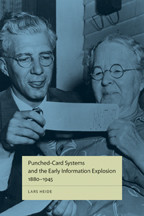
Reviews
In The Telegraph in America, 1832–1920, David Hochfelder provides a taut and consistently intelligent history of the telegraph in American life. The book is notable for both its topical breadth—encompassing war, politics, business, journalism, and everyday life—as well as its focused, argument-driven chapters.
The author... develops nuanced analyses to the impact of telegraphy on upon American life.
Hochfelder’s work is exemplary in its caution about mediator technology-specific claims to exceptionalism or determinism. This authoritative and persuasive book will remain an essential reference for scholars.
For a quick assessment of telegraphy’s development and impact, this insightful book is hard to beat.
While offering new insights into the relationship between Western Union and Associated Press, Hochfelder's strongest contribution to the history of telegraphy is his analysis of wiring on financial markets and the subsequent spread of speculation and gambling fueled by private wires and telegraph ticker services.
Heavily researched and very clearly presented.
Hochfelder left no stone unturned in this well balanced and scholarly examination of the telegraph, those it served, and the impact it had on society.
Hochfelder's writing is lucid, engaging, and confident. The book will be of interest to a wide audience, from general readers to scholarly specialists.
Hochfelder’s work provides an excellent overview of the history of the telegraph in the USA, particularly, from the 1860s to the 1920s. The book offers much insight into the role of telegraphy in shaping American society. It provides an excellent history of the industry from a business perspective and uses this to advance our understanding of debates concerning monopolies, as well as state ownership and regulation of utilities in late nineteenth and early twentieth century America.
This well-researched and lucidly argued book will prove indispensable to specialists in the history of technology, journalism, and finance.
Book Details
Acknowledgments
Introduction Why the Telegraph Was Revolutionary
1. "Here the Telegraph Came Forceably into Play"
2. "As a Telegraph for the People It Is a Signal Failure"
3. "There Is a Public Voracity
Acknowledgments
Introduction Why the Telegraph Was Revolutionary
1. "Here the Telegraph Came Forceably into Play"
2. "As a Telegraph for the People It Is a Signal Failure"
3. "There Is a Public Voracity for Telegraphic News"
4. "The Ticker Is Always a Treacherous Servant"
5. "Western Union, by Grace of FCC and A.T.&T."
Conclusion The Promise of Telegraphy
Chronology of the American Telegraph Industry
Notes
Essay on Sources
Index





